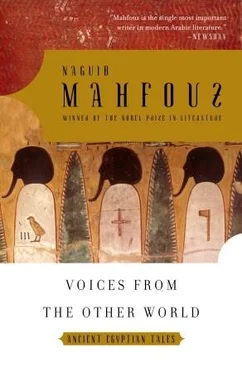In the morning, he commanded his son and his companions to come to him upon his throne. They all prostrated themselves, averting their glances, debased and vanquished by their own obsequiousness. The king regarded them for a long time, an ambiguous smile upon his lips. Then he addressed them, with a shocking serenity.
“I have forgiven you — all of you.”
Bafflement swept over them — they could not believe their ears. They stared in awe at the king seated upon his throne, exchanging looks of confounded incredulity. Pharaoh spoke to them again in his wondrous calm, “I know what I am saying — I have indeed pardoned you all. Return to your posts and direct yourselves to your tasks with the purpose and sincerity with which I have charged you.”
The governor of Nubia was unable to restrain himself. “You would pardon, my lord,” he said, “those who usurped your throne, and drove you from your kingdom without mercy? You would forgive them, my lord, whose robes are still splotched with the blood of those that they slew in fighting you?”
The king said, still smiling, “Who would be my new heir apparent? And who would be a more pious priest than Samun, or a more able vizier than Horurra, or a more skillful commander than Samunra? If only Queen Tey had not hastened to put an end to herself — for I would love that she were seated next to me on this throne once more. As for sincerity, my dear governor, I have come to the point of thinking the worst of all men. I hold no more trust in you than in these others — for all people seek refuge in the shade of the leafy tree, but when winter strips it bare they forsake it without regret. Therefore it would gain me nothing to put these people to death. On the contrary — for I would find no one better to take their places.”
And so King Userkaf lived the rest of his life at an emotional remove from the world. He knew no intimates in his palace at Aswan — not from the teeming masses of his people, nor from his covetous royal courtiers. There was only his loyal friend, Zay.

I am deeply embarrassed to tell this tale — for some of its events violate the laws of reason and of nature altogether. If this were merely fiction, then it would not cause me to feel such embarrassment. Yet it happened in the realm of reality — and its victim was one of the most renowned and extraordinary men of Egypt’s political and aristocratic circles. Moreover, I am relating it as recorded by a great professor in the national university. There is no room for doubt of his sentience or his character, nor is he known for any tendency toward delusions or wild stories. Still, it may truly be said, I do not know how to believe it myself, nor to persuade others to do so. This is not due to the want of miracles and wonders in our time. Yet rational people of our day do not accept matters without good cause — just as they do not oppose putting faith in something if there is a logical explanation for it. Though the strange account that I now transmit has claims of authenticity, a coherent narrative, and tangible attestations, the scientific basis for it is still much in doubt. Would I not, then, express my hesitation in presenting it?
Whatever one makes of the matter, here it is as portrayed by Dr. Dorian, professor of Ancient Egyptian Archaeology at Fuad I University:
On that painful day, when the heart of Egypt shook with anguish and sorrow, I went to visit the late Mahmoud Pasha al-Arna’uti at his grand country palace in Upper Egypt. I remember that I found the Pasha with a group of friends that flocked around him when circumstances permitted. Among them was M. Saroux, headmaster at the school of fine arts, and Dr. Pierre, the expert on mental diseases. We all gathered in his elegant, sophisticated salon, filled with the choicest examples of contemporary art — both paintings and sculpture. It was as though they were marshaled in that place in order to convey the salute of the genius of modernity to the memory of the immortal Pharaonic spark. Buried in the ruins of the Nile Valley, its light nonetheless burned through the darkness of the years like the points of the harmonious stars in the sky, a voyager through the void of the jet-black night.
The deceased was among the richest, most cultured people in Egypt, and the noblest in disposition. His friend Professor Lampere once said of him that he was “three persons in one”—for he was Turkish in race, Egyptian in nationality, and French in his heart and mind. To achieve his acquaintance was the height of accomplishment.
In fact, the Pasha was France’s greatest friend in the East — he thought of her as his second country. His happiest days were those that he spent beneath her skies. All of his companions were drawn from her children, whether they lived on the banks of the Nile or the Seine. I myself used to imagine, when I was in his salon, that I had suddenly been transported to Paris — the French furniture, the French people present, the French language spoken, and the French cuisine. Many French intellectuals did not know him except as a singular fancier of French art, or as a composer of passionate verse in the fine Gallic tongue. As for me, I knew him only this way — as a lover of France, a fanatic for her culture, and a preacher of her policies.
On that fateful day, I was sitting at the Pasha’s side when M. Saroux said, while scrutinizing a two-inch bronze bust with his crossed and bulging eyes, “You fortunate man, your palace needs but a trifling change to turn it into a complete museum.”
“I certainly agree,” the doctor ventured, tugging at his beard contemplatively, “for it is a permanent exhibit of all the schools of genius combined, with an obvious Francophile tendency.”
The Pasha chimed in, “Its greatest virtue is in my balanced taste, which moves equally between the various trends, treating the rigid views of the differing schools all the same. And which strives for the enjoyment of beauty — whether its creator be Praxiteles or Raphael or Cézanne — with the exception of radical modern contrivances.”
As I spoke, I glanced covertly at M. Saroux, teasing whom always delighted me, and said, “If the Ministry of Education could move this salon to the Higher College of Fine Arts, then they wouldn’t waste money sending study missions to France and Italy.”
M. Saroux laughed, swiveling to address me, “Then maybe they could save on the French headmaster, as well!”
But the Pasha said seriously, “Be assured, my dear Saroux, that if it were possible for this museum to leave Upper Egypt, then it would be heading straight for Paris.”
We stared at him with surprise, as if we did not believe our ears. In truth, the Pasha’s art collection was worth hundreds of thousands of Egyptian pounds — all of which had flowed into French pockets. It was stunning that he would think of donating it to France. While we were entitled to rejoice and be glad at this idea, nonetheless I could not restrain myself from asking:
“ Excellence , is what you are saying true?”
The Pasha answered calmly, “Yes, my friend Dorian— and why not?”
M. Saroux broke in, “How deservedly happy and jubilant we French should be! But I must tell your Excellency sincerely that I fear this may bring you a great many troubles.”
When I seconded M. Saroux’s view, the Pasha shifted his blue eyes back and forth between us with a sarcastic expression, and asked in feigned ignorance, “But why?”
Without hesitation, I said, “The press would find that quite a subject!”
“There is no doubt that the nationalist press is your old enemy,” said Dr. Pierre. “Have you forgotten, Your Excellency, their biased attacks against you, and their accusations that you squander the money of the Egyptian peasants in France without any accountability?”
Читать дальше













